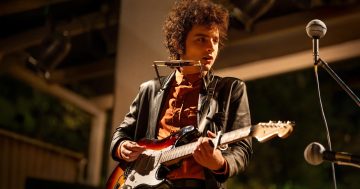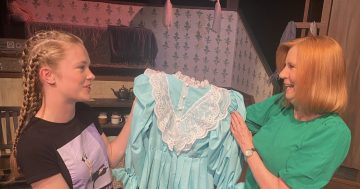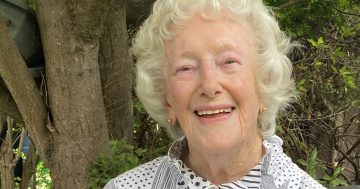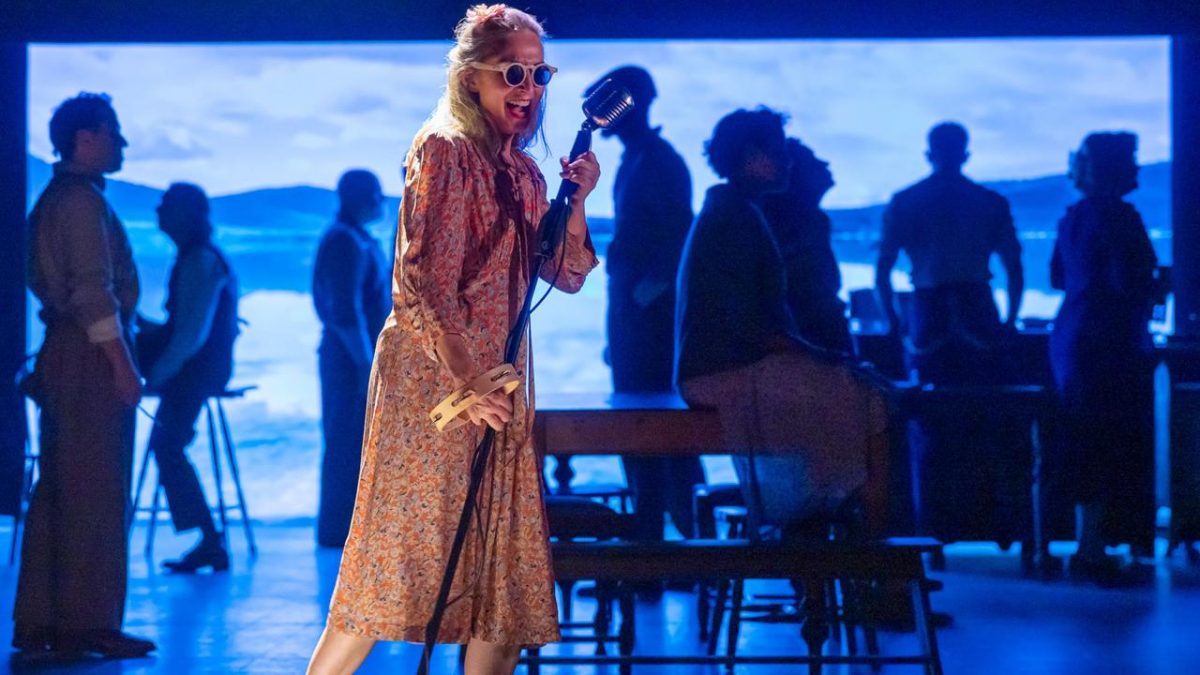
Lisa McCune plays Elizabeth in Girl from the North Country. Photo: Supplied.
Lisa McCune doesn’t usually miss characters when she finishes playing them.
Australia’s reigning queen of musical theatre has starred in everything from Cabaret to South Pacific. But in Elizabeth, the central role in Girl from the North Country, she’s found a character who will be hard to leave behind.
“I feel like I’ve found something in myself in her. I’ve found such a connection with that character. I adore her”, she tells me via Zoom from New Zealand, where the show is playing to packed houses.
The musical is based on Dylan’s songbook and centred on a broken down Minnesota boarding house in the midst of the Great Depression. It comes to the Canberra Theatre at the end of August after international acclaim.
Elizabeth is a remarkable figure: among a strong ensemble cast, she plays a woman slipping in and out of early dementia. She is by turns confused and concise, a kind of truth teller who evokes irritation, compassion and uncertainty in equal measures.
Her husband Nick is desperately loyal to her – but sleeping with one of the guests. Her son, a would-be writer, is spiralling into alcoholism, her adopted black daughter is mysteriously pregnant and all around Duluth, cold snow is falling in the darkness. Like Elizabeth’s family, America is on its knees and utterly broken.
“To me it feels like a gift,” McCune says of her role.
“I’ve been given license to play within the piece every night. So to me there’s always a certain freshness that I’m allowed to have, an impish kind of quality to my Elizabeth. I like that she’s a little bit of a cage rattler, a bit of a disrupter.”
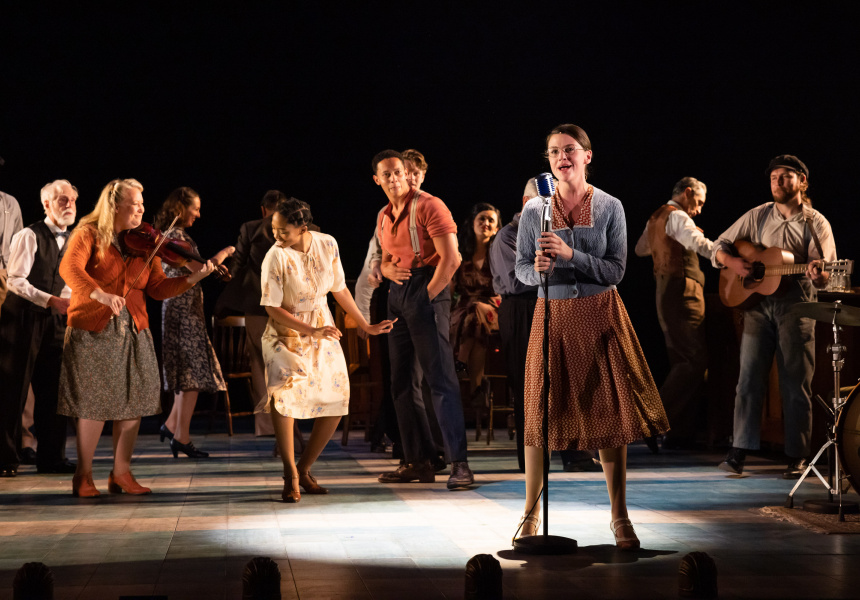
Girl From The North Country features a strong ensemble cast. Photo: Supplied.
McCune says the cast weren’t given backstories for the piece but have developed their own ideas about where they’ve come from and how they’ve drifted into the depths of a despairing Midwestern winter.
“I think that she used to love dancing. I’ve got a line in the show where I say, ‘are we going to the movies?’ to my daughter at the end of act one. And I think that that’s so glorious. I think she loved going to the movies, she’d love to dance with Nick.
“She was progressive because she took on a black child and educated that child and daughter and loved, loved her. Absolutely.
“They’re all the little gems that (writer and director) Connor McPherson puts out along the path for you to collect as an actor.”
Dylan’s music weaves an unexpected web throughout the production, illustrating not so much the action on stage as the characters’ internal monologues, perhaps even their souls. Each actor sings, each actor plays an instrument and while there are hits like Hurricane, many of the arrangements – like the lesser known I Want You – are lilting, evocative and at first almost unrecognisable.
“You might be in the middle of saying something, something to another character like I feel for you, but I don’t know how to say I love you,” McCune says.
“Because you can’t use the spoken word anymore, the action stops and the song starts up.”
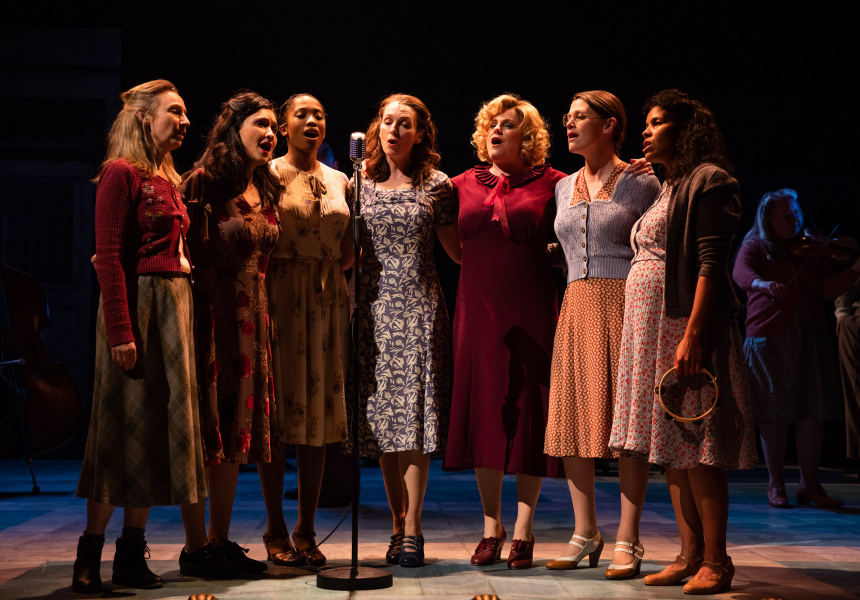
Dylan’s music runs parallel to the story of broken lives in Girl from the North Country. Photo: Supplied.
McPherson is Irish and McCune draws a line between the struggles illustrated by the cast and those that drove Irish emigration.
“I guess that hardship is something that the generations have all gone through. You hear the stories of older people, and it doesn’t matter where they’re from, they’re always human experiences we have in common,” she says, adding that audience members are often visibly deeply moved.
The piece is visually striking: cast members approach an old fashioned radio microphone and often appear in silhouette against vintage black and white streetscapes. The narration provided by Dr Walker, himself a former morphine addict, is reminiscent of Garrison Keillor’s Lake Woebegone Days. It evokes family stories about love and loss that are long polished by the telling.
“My favourite line in the show is in my final speech, when Elizabeth is talking about Nick seeing her for the first time. He says she appears plain to everybody else but she’s uncloaked her beauty just for him. Those simple words describe one of the most basic human feelings. And I love that,” McCune says.
Girl from the North Country is at the Canberra Theatre from 25 August to 3 September. Bookings here.
Original Article published by Genevieve Jacobs on Riotact.







